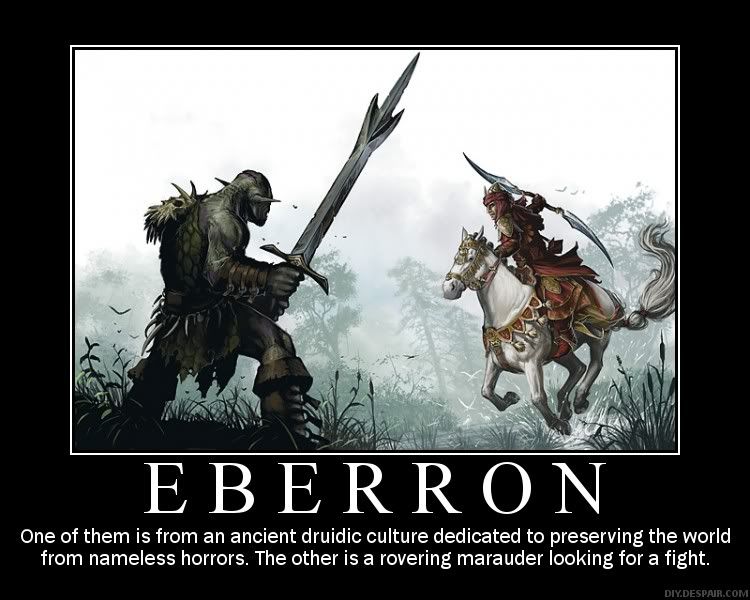 |
| (Image: wikipedia) |
Quoting Wizards of the Coast:
[Eberron] combines pulp adventure and intrigue in a world where magic-driven technology has produced airships, trains, and similar advancements comparable to early 20th-century Europe.It's a rather low-level D&D setting, with very few NPCs topping level 10. If the DM emphasizes the setting's grit and intrigue elements over the techno-magical ones, the campaign can express the mindset and tone of movies like Brotherhood of the Wolves, From Hell, The Name of the Rose, Pirates of the Caribbeans and Raiders of the Lost Ark. Taken into the techno-magical grey-zone, scenes from movies like Blade or even League of Extraordinary Gentlemen can be depicted.
This versatility - along with the relatively low power level - is what attracts me the most to this setting. I can cater to a lot of tastes, grabbing ideas from various books, movies and TV shows while stilling feeling I'm playing D&D.
Want a vampire slaying session, with the PCs armed by a shady governmental agency dedicated to undead-slaying supplying them with Batman-like gadgets? Check!
A James Bond scene in which the PCs try to hijack a gnomish submarine in order to bring it for inspection by the authorities? Check!
An out-of-the-blue Startrek session with the PCs serving onboard the Enterprism - a House Lyrindar Airship sent to explore strange, new lands?
 |
| (Image: 1d4chan.org) |
And the list goes on and on…
One of the most interesting aspects of Eberron is the 'shades of grey' approach to everything related to Alignment. Unlike most D&D settings, Good and Evil in Eberron are in the eyes of the beholder. A nation that employs undead as troops in the Forgotten Realms setting (think Thay) is an evil force to be reckoned with. No good-aligned ruler will even consider such a horrendous idea. But in Eberron, the nation of Karrnath have used undead as troops for years now, but it is a proud human nation with a strong military tradition. Evil? some will say so, but most of its citizens shrug and continue with their daily lives, dismissing their undead guardians as a necessity in a harsh world.
DM'ing a session in Eberron is actually a lot of work, especially for me, as I really like an intrigue heavy plot with lots of NPCs and 'powers behind thrones'. It means I need to be prepared with various agendas, goals and secrets each NPC have, in order to easily improvise when the players interact with them.
Again Eberron's way of 'doing things' works the way I like it - as Eberron encourages plenty of slow-paced investigation scenes broken by a few fierce combat scenes. It's never a 'room after a room' with Goblins (or other monsters) guarding chests of treasure and a boss fight in the end. In Eberron, the dungeon is most likely deserted, with the only real danger being the double-agent guide the PCs hired..
Because Eberron's tone is different from the baseline 'Heroic Fantasy' assumed by the D&D rules, the simple 'kick-in-the-door' style of play (played with one-line background PCs) will never life up to the full potential of the setting. If you want a successful Eberron campaign, you should consider to add the following ingredients:
- A patron to kick-start the first few 'quests'. It can be an agent of an shady organization, a noble with aspirations, or a merchant 'who knows too much'. Someone the PCs can trust (at least to a point) with the ability to point them in the right direction if they are lost.
- PCs with goals, agendas and secrets, with some ties to the patron. Goals, agendas and secrets are a must if you want rounded PCs that will be able to pick the story up and drive it themselves. Ties to the patron are needed for the first few sessions, until the PCs find another anchor to build their story around.
- Slowly expanding 'fog-of-war' circles. In an intrigue heavy campaign, the PCs spend most of their time in the dark. But that darkness needs to recede if you want them engaged. It also need to recede slowly enough to allow you some room to maneuver, since intrigue scenarios are really susceptible to unexpected PC actions. Your plot should be two or three steps ahead of the PCs 'sphere of influence'. Too close, and you risk them 'blowing your cover' and killing your campaign too soon. Too far, and you risk a very loose coupling between the story and the PCs actions.
You'll also want to discuss the world with your players. Knowledge of the world's history is not a must, but some familiarity and 'openness' to the setting's quirks can a boon.
Here's a good finisher to exemplify the special tone of this setting:
 |
| (Image: http://i605.photobucket.com) |
Care to guess which is which?
Enjoy!

No comments:
Post a Comment